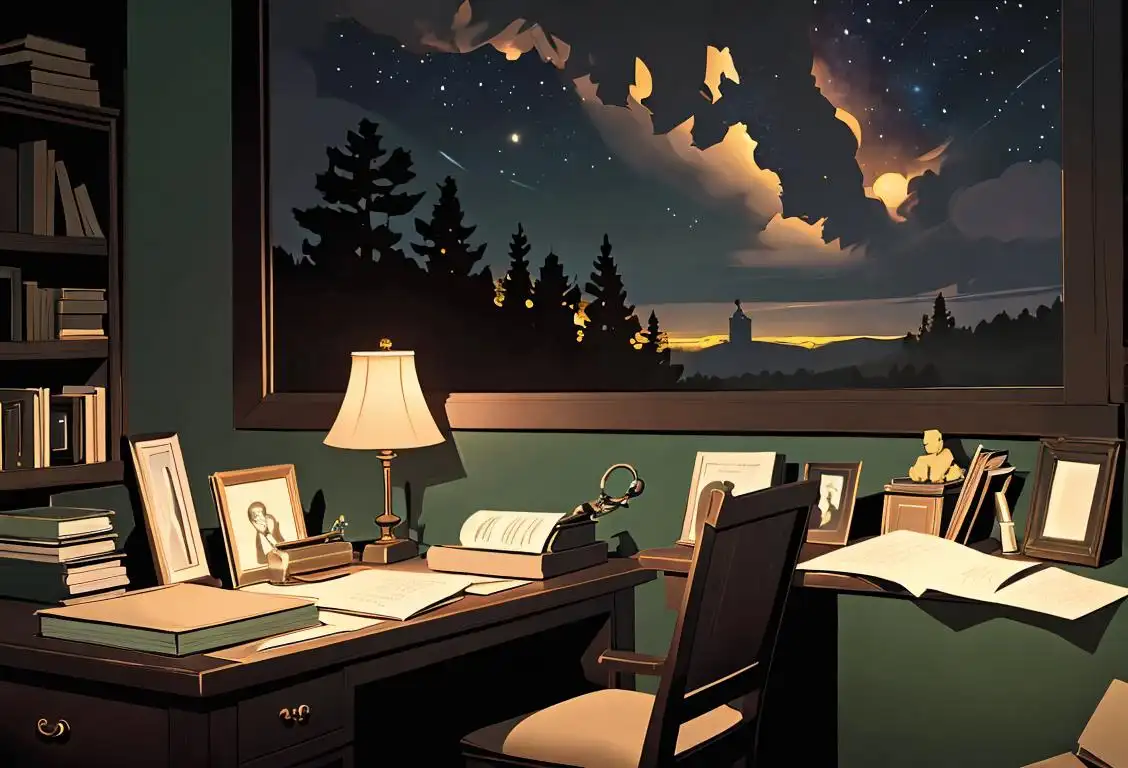National Author Day

Ah, National Author Day, a day dedicated to those amazing individuals who whisk us away to far-off lands and introduce us to characters we come to love and cherish. Whether they're crafting thrilling mysteries or writing heartwarming romances, authors have a magical way with words. So grab your favorite novel, find a cozy spot, and let's celebrate these literary wizards together!
When is Author Day?
It's national author day on the 1st November.
A Brief History of National Author Day
Did you know that National Author Day has been around since 1928? It was established by the General Federation of Women's Clubs as a way to recognize the contributions of American authors and encourage their valuable work. The date of November 1st was chosen to coincide with the birthday of renowned American author and humorist, Mark Twain.
Since its inception, National Author Day has been an opportunity for readers to express their gratitude towards authors who fill their lives with stories. It's a chance to show appreciation for the countless hours of entertainment and enlightenment they provide.
Over the years, the internet has played a significant role in shaping the celebration. Online communities, book clubs, and social media platforms have given readers a platform to connect with their favorite authors, share recommendations, and express their gratitude for the literary worlds they've been transported to.
How to Celebrate National Author Day
Now, you might be wondering how you can join in on the festivities, right? Well, fear not! We've got a few ideas to help you mark this special day:
- Support Local Bookstores: Visit your favorite independent bookstore and pick up a new release or an old favorite.
- Write a Fan Letter: Take a moment to send a heartfelt message to an author whose work has touched your life. They'll appreciate it more than you can imagine!
- Start a Book Club: Gather your friends, find a cozy spot, and discuss your favorite books. You can even invite authors to join your discussions through virtual events.
- Download eBooks: If physical books aren't your thing, explore the vast collection of eBooks available online. Discover new authors and dive into different genres.
Did You Know?
A fun and interesting fact to lighten up your day: Did you know that the world's longest novel, according to the Guinness World Records, is 'À la recherche du temps perdu' (In Search of Lost Time) by Marcel Proust? This literary marvel spans a whopping 13 volumes with over 1.2 million words! Talk about dedication to storytelling!
History behind the term 'Author'
1175
The birth of 'author'
The term 'author' originated from the Old French word 'auctor' in the year 1175. It derived from the Latin word 'auctor,' which means 'founder' or 'creator.' During this time, 'author' referred specifically to someone who originated or created something, such as a work of art or a written document.
14th century
The Birth of the Term
The term 'author' originates from the Old French word 'auctor,' which came into English usage around the 14th century. It initially referred to a person who brought something into existence or had a hand in creating it. The concept of authorship was closely related to the act of invention or origination during this period.
1175
The Birth of 'Author'
The term 'author' first appeared in English in the late 12th century, around 1175. It was derived from the Old French word 'auctor', which itself came from the Latin word 'auctor'. The Latin root 'auctor' meant 'creator' or 'one who causes to grow.' In its early usage, 'author' referred to someone who wrote or composed something, such as a book or a piece of music.
16th century
Writers and Producing Literary Works
During the 16th century, the term 'author' began to be associated specifically with writers and individuals who produced literary works. This shift in meaning established a clear distinction between authors and other creators. It highlighted the importance of individual artistic expression and creativity in the realm of literature.
14th Century
Expanding the Meaning
During the 14th century, the meaning of 'author' started to expand beyond just writing or composing. It began to encompass the idea of being the originator or cause of something, not only in the realm of literature or music but also in various other areas. This expansion reflected the understanding of 'author' as someone who created or initiated something, whether it be a concept, a movement, or an invention.
14th century
Expanding the meaning
In the 14th century, the meaning of 'author' expanded to include specifically those who wrote books or works of literature. This narrowed down the application of the term, focusing it on individuals who were responsible for the creation of written content.
15th century
The significance of 'authorship'
During the 15th century, the concept of 'authorship' gained significance. It was linked to intellectual property rights and legal ownership. With the advent of the printing press, the idea of attributing authorship became crucial in distinguishing one's work from others. Additionally, it facilitated the protection of creations through copyright.
15th Century
Authorship and Ownership
In the 15th century, the concept of 'authorship' became closely connected to ownership and legal rights. Copyright laws emerged, and the term 'author' became associated with the person who held the exclusive rights to a written work. This development emphasized the idea that the author was not only the creator but also had legal control over their creation.
18th century
Rise of Copyright and Ownership
In the 18th century, the concept of authorship gained legal significance with the rise of copyright laws. These laws granted creators exclusive rights and ownership over their works. The term 'author' became intrinsically linked to the notion of intellectual property and the protection of creative works.
19th century
Expanding Mediums and Authorial Identity
With the advent of various mediums in the 19th century, such as newspapers, magazines, and novels, the role of the author expanded. Authors began to develop individual identities, often recognized by their distinctive writing styles. This period also witnessed the emergence of celebrated authors whose works achieved widespread popularity and recognition.
18th Century
Author as a Celebrated Figure
By the 18th century, the status of the 'author' underwent a significant transformation. Authors began to be recognized and celebrated as individuals of talent and creativity. Literary figures such as Shakespeare, Milton, and Voltaire gained renown, and the profession of authorship started to hold a respected place in society. The term 'author' took on a new cultural significance, representing an esteemed creative genius.
1662
Statute of Anne
In 1662, the Statute of Anne was enacted in England, marking the first copyright law. This legislation granted authors exclusive rights to their published works for a limited period. The Statute of Anne set the foundation for subsequent copyright laws across the world, solidifying the legal rights of authors.
20th century
Exploring Literary Theory and Postmodernism
The 20th century saw the exploration of literary theory, including postmodernist perspectives on authorship. Postmodernism challenged the traditional notion of the author as the sole authority of meaning in a text. It emphasized the role of readers, cultural influences, and intertextuality in shaping the interpretation of a work. This shift sparked lively debates about the nature of authorship and its boundaries.
20th Century
Authorship in the Modern Era
In the 20th century, the role of the author continued to evolve with the advent of mass media and digital technologies. The definition of an 'author' expanded further to include creators of not only literary works but also films, television shows, music, and other forms of media. The rise of the internet and self-publishing platforms opened doors for aspiring authors, democratizing the authorship process.
19th century
Rise of the professional author
The 19th century witnessed the rise of the professional author. The development of publishing houses, increasing literacy rates, and the demand for literary works led to authors making a living solely from their writings. Notable authors like Charles Dickens and Jane Austen emerged during this period.
21st century
Digital Age and Collaborative Authorship
In the digital age, the concept of authorship has undergone further transformations. The rise of blogging, social media platforms, and online communities has enabled collaborative authorship and the democratization of content creation. The traditional notion of a single author has expanded to include collective efforts, co-creation, and creative commons. This contemporary landscape continues to shape our understanding of the term 'author.'
20th century
Diversification of authorship
The 20th century brought about a diversification of authorship. The definition of an author expanded to encompass various forms of creative expression beyond literature, including plays, screenplays, poetry, non-fiction, and more. This expansion reflected the evolving art and media landscape of the modern era.
Present
Diverse Forms of Authorship
Today, the term 'author' encompasses a wide range of creative expressions and the mediums through which they are presented. It no longer solely refers to writers of books but includes bloggers, podcasters, video creators, and social media influencers. The notion of authorship has become more fluid, emphasizing the act of creation, communication, and engagement with an audience rather than being limited to traditional publishing.
Present
Digital age and self-publishing
In the present era, advancements in technology and the rise of the internet have revolutionized authorship further. Self-publishing platforms and e-books have democratized the process, allowing aspiring authors to publish their works independently. The digital age has also introduced new challenges and opportunities for authors, shaping the way they create, distribute, and market their writing.
Did you know?
Did you know that the world's longest novel spans over 1.2 million words? That's a whole lot of storytelling!Tagged
romance fun rememberanceFirst identified
1st November 2015Most mentioned on
1st November 2016Total mentions
422Other days
Family Day
One Day
Spouses Day
Action Day
Happiness Day
Opposite Day
Boyf Day
Do Something Nice Day
Seniors Day
Believe Day









